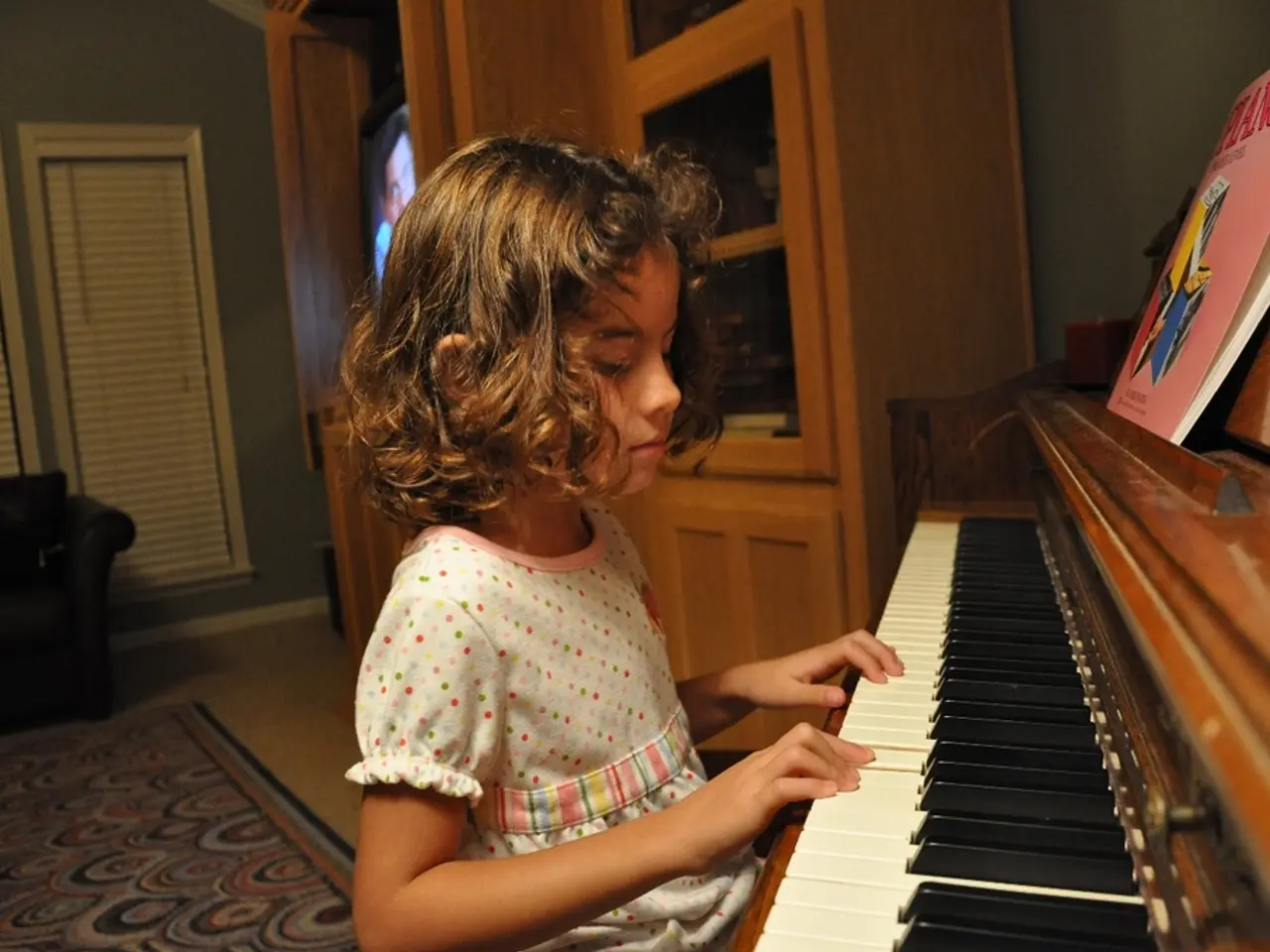Impact of Music on Infant Brain Development
Incorporating music into a baby's daily routine offers long-term benefits for brain development, emotional well-being, and social interaction. Research has shown that early exposure to music can have a profound impact on a baby's cognitive skills, language development, and emotional development [1][2][3][4].
Language Development
Music and singing expose babies to rhythm and melody, helping them anticipate speech patterns and develop early language and literacy skills. Studies show that musical play enhances neural processing of speech sounds, supporting communication and reading readiness [1][3][4].
Cognitive Gains
Music encourages memory, attention span, concentration, problem-solving, and even abilities in related areas like math and science through pattern recognition and focused engagement [1][2][4].
Motor Skills and Coordination
Interactive musical activities like clapping, tapping, and playing simple instruments promote both fine and gross motor skill development and hand-eye coordination [1][3].
Emotional and Social Development
Music facilitates emotional bonding between baby and caregiver, teaches emotional cues through tone and rhythm, and promotes empathy, social skills, and emotional resilience [1][3][4].
Stress Reduction and Sleep Improvement
Music has calming effects that reduce stress and can help babies sleep better [1].
Additionally, specific approaches like playing classical music (e.g., Mozart Effect) tuned to certain frequencies may stimulate brain areas associated with thinking, language, and creativity, serving as a "music vitamin" for brain nourishment from an early age [5].
Aiding Relaxation
Music listening sessions provide a unique opportunity for babies to experience different genres and styles of music, aiding relaxation. Props like scarves or ribbons can add a visual element to music and movement activities. Calm music with slow tempos and soothing melodies can help babies wind down and prepare for sleep.
Creating Positive Associations
Cheerful and rhythmic songs can create positive associations with mealtime. Music can help regulate the pace of eating and provide a soothing backdrop for a peaceful mealtime experience.
Broadening Musical Appreciation
Exposing the baby to different genres, styles, and cultures of music can broaden their musical appreciation and stimulate their cognitive development. This process begins in utero and continues through the early years of life, setting the foundation for future cognitive, emotional, and social capacities.
Active Engagement
Actively engaging with the baby while playing music can support language development, emotional bonding, and overall engagement. It's essential for parents to pay attention to the baby's cues and adapt the music choices based on their preferences and comfort level.
Age-Appropriate Music
Age-appropriate music should be selected, with simple melodies, repetitive lyrics, and gentle rhythms for newborns and infants. Incorporating music with varying tempos can further enhance brain development. Creating a playlist with lively songs for playtime and soothing melodies for winding down before nap or bedtime is beneficial.
Incorporating music into daily routines can optimize a baby's brain development, enhance their emotional well-being, and strengthen bonds with caregivers. By embracing the power of music, parents can provide their babies with a rich and stimulating environment for growth and learning.
[1] Moreno, F., & Broughton, S. (2012). The Oxford Handbook of Music Psychology. Oxford University Press. [2] Trehub, S. E. (2003). Musical preferences in infancy. Trends in Cognitive Sciences, 7(10), 463-467. [3] Trehub, S. E., & Trainor, L. J. (2003). The ontogeny of musical preferences: What can infants and young children tell us about the nature of music? Psychology of Music, 31(2), 205-223. [4] Trainor, L. J. (2011). The role of music in development: A review of the evidence. Psychology of Music, 39(4), 407-431. [5] Rauscher, F. H., Shaw, G. L., & Ky, K. N. (1993). Music training causes long-term enhancement of preschool children's spatial-temporal tasks. Nature, 365(6447), 611.
- By exposing babies to various musical genres, families can stimulate their cognitive development and broaden their musical appreciation, setting the foundation for future personal growth.
- Music-focused parenting strategies, such as playing soothing melodies before bedtime, can help optimize a baby's emotional well-being and improve overall sleeping patterns.
- During playtime, interactive musical activities like clapping and playing simple instruments can help nurture a baby's fine and gross motor skills, as well as their hand-eye coordination.
- Research in home-and-garden and lifestyle publications has demonstrated that early exposure to music can have a significant impact on a baby's ability to recognize patterns, a skill that may carry over into math and science later in life.
- Caregivers can utilize music as a tool for strengthening emotional bonds with their babies by singing songs and introducing various melodies that create positive connections during daily routines.
- Music plays a crucial role in emotional development, teaching babies about emotional cues through tone and rhythm, while also promoting empathy, social skills, and emotional resilience.
- Engaging in activities like active listening sessions or playing along to simple instruments contributes to a baby's emotional well-being, language development, and overall engagement with their caregivers.
- Parents should select age-appropriate music for their babies, opting for simple melodies, repetitive lyrics, and gentle rhythms, and ensuring that the music chosen suits the baby's comfort level and preferences.
- Incorporating a varied tempo in a baby's musical playlist can further aid in brain development, with livelier songs for playtime and calmer melodies for winding down before nap or bedtime.
- By prioritizing music and singing as part of the daily routine, parents can create a conducive learning environment for their babies, stimulating cognitive skills, language development, and emotional growth, while fostering strong familial bonds.




